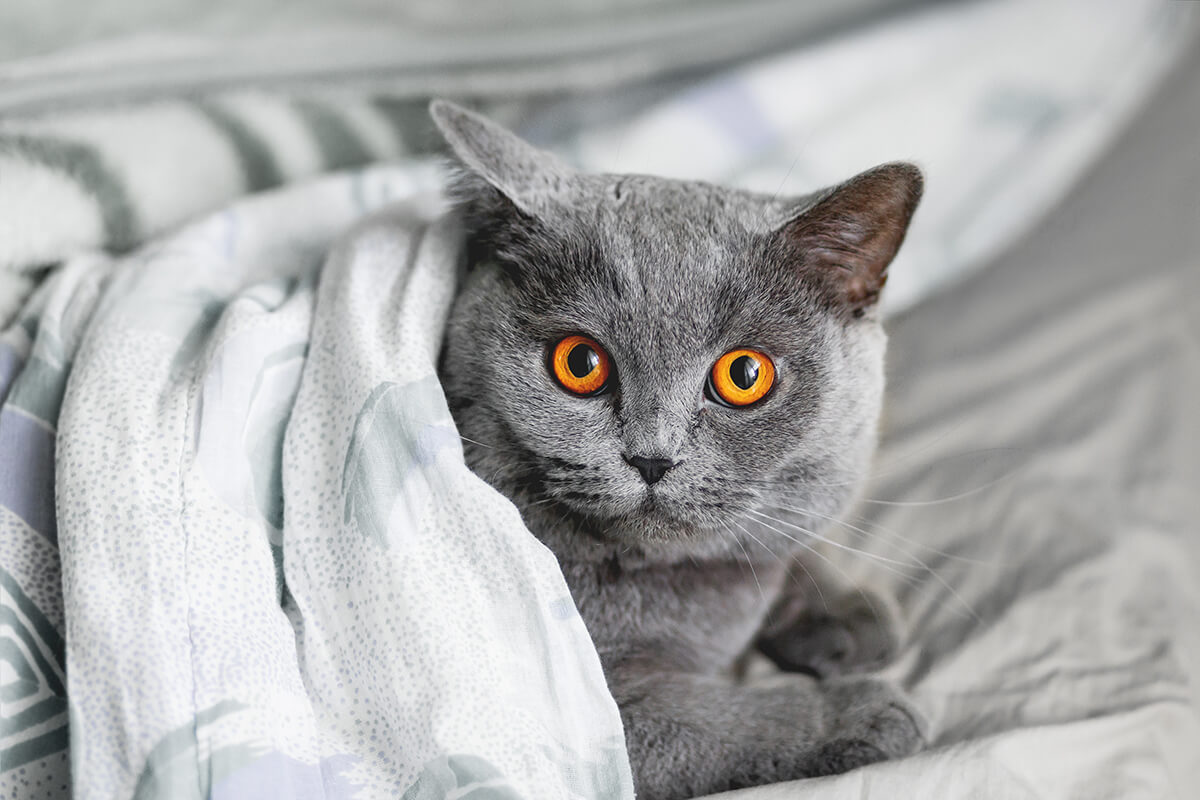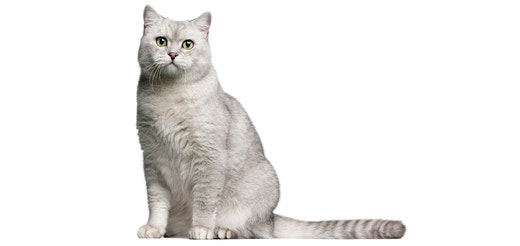
British shorthair cat overview
There’s a reason why British Shorthair cats are one of the most popular cat breeds in the UK, according to the GCCF (Governing Council of the Cat Fancy). In fact, there are many reasons. British Shorthairs are a beloved breed, known for their beautiful appearance and endearing personality. Besides the unique characteristics of British Shorthairs, these cats make excellent family pets, are low maintenance and can adapt to different environments and households. The British Shorthair lifespan ranges between 8-12 years, meaning you can have many happy years with your feline friend.
In this article, we talk all about the British Shorthair breed, covering the following:
History and origin
Characteristics
Grooming and hygiene
Behaviour and training
Mental and physical needs
Nutritional requirements
Suitability for families
Finding a breeder
Health considerations
FAQs
Breed history and origin
The British Shorthair breed can be traced back to the ancient cats of Rome, and were thought to have been brought here by the Romans. They were originally utilised for rodent control, both on sea and on land. It was during the Roman Era that the breed became firmly rooted in the UK, after mixing with the local European wildcats.
However, the breed as we know it today was refined during the Victorian era, when cat enthusiasts selectively bred certain characteristics to present British Shorthairs as show cats. In fact, in 1871 this breed was presented at the first-ever cat show in London. While there was shortage in breeding stock during both WW1 and WW2, breeders worked hard to maintain the British Shorthair breed. Since then, the modern British Shorthair has conquered the position as one of the most popular breeds in the UK.
Key characteristics of the British Shorthair cat breed
British Shorthair characteristics are exceptionally unique, which set the breed apart from other cat breeds. With their round faces, strong build and plush coat, their striking beauty is hard to miss - and only due to their medium-large size. The British Shorthair personality also does not disappoint, as they are particularly relaxed and affectionate pets. They develop strong bonds with their human companions, but are just as comfortable when left to their independence. Given their calm temperament, British Shorthair cats are suitable for families with children, as well as indoor living.
Physical characteristics of the British Shorthair cat breed
Part of why cat enthusiasts around the world adore the British Shorthair characteristics is because they have distinctive features. British Shorthairs, especially the males, tend to have a muscular build, with strong legs and broad chests. Their size is considered to be between medium and large, with female cats weighing between 3-6kg, and male cats between 4-8kg.
The British Shorthair coat is also admired for being short, dense and plush, along with the variety of colour variations. While charcoal grey is what this breed is usually recognised by, their colours can vary from white to black, including cream, lilac, red and brown. There are also a variety of coat patterns, with some British Shorthair cats being tabby, bicoloured or colour-pointed.
Another notable characteristic of the British Shorthair are their round faces which, along with their rounded eyes, cheeks and ears, creates a plump appearance. With their large eyes set wide apart, the British Shorthair often has an expression that is simply adorable.
British Shorthair cat’s grooming and hygiene needs
With a short but thick coat, British Shorthairs require less maintenance compared to longer-haired breeds. However, it’s still important to groom your British Shorthair cat once a week to remove loose hair and distribute natural oils.
It’s also important to note that British Shorthairs can shed a lot, especially during spring, which is why regular grooming is necessary to reduce shedding and hairballs. The best tools to use for their coat include a soft-bristled brush, fine-tooth comb or grooming mitt. Learn more about cat grooming for best results.
Since most cats hate water, being bathed can be a stressful experience for them and therefore should be avoided unless absolutely necessary. British Shorthairs are quite effective at licking themselves clean, and there are other ways you can help maintain a healthy cat coat instead. If you do need to bathe your cat, make sure to only use cat shampoo and rinse thoroughly to avoid product build-up that can lead to an oily coat. Besides this, British Shorthair cats will benefit from general hygiene, including regular nail trimming, ear cleaning and eye care.
British Shorthair cat’s behaviour and training needs
The British Shorthair personality includes a calm temperament and independent nature, which influences their training needs. Since they are quite laid-back, they may be less vocal and more reserved, which can lead to them being indifferent about training sessions - at least as first. However, British Shorthair cats are very intelligent, so with consistency, patience and positive reinforcement, they can respond well to training.
It’s best to start with simple commands, such as ‘sit’, to encourage your cat into training. Positive reinforcement is an effective technique, so using treats and praise as a reward can help reinforce desired behaviours. As a cat parent, you’ll be pleased to know it’s quite easy to litter train a British Shorthair, as long as you are dedicated to the training process. Early socialization as a kitten is another factor that will determine how comfortable this breed is with new people, animals and environments. You can learn more about socialising and playing with your cat.
Although unlikely as British Shorthair cats are often well-behaved, if you find any challenges such as excessive meowing or scratching, be sure to use redirection with toys and scratch posts, while practising positive reinforcement techniques. You should never punish your cat as this can increase their stress levels and potentially lead to more unwanted behaviours. Check out our tips about cat behaviour.
Mental and physical engagement for British Shorthair cats
Given the intelligence of British Shorthairs, cat parents will need to provide plenty of mental and physical stimulation for their overall well-being. This cat breed will benefit from a daily routine, with play opportunities and engaging activities planned. Not only will this prevent your cat from becoming bored and displaying unwanted behaviours, but it will also nourish their natural abilities and allow them to lead happy and fulfilled lives.
There are many ways to keep your British Shorthair cat stimulated. For example, puzzle toys that dispense treats will give your cat the opportunity to problem-solve, as well as hunt for their food. On the other hand, climbing structures and cat trees will not only promote exercise, but also allow your cat to explore their surroundings. This is especially important for indoor cats, who can otherwise be at the risk of obesity or boredom.
The British Shorthairs personality, while not overly energetic, can be playful, so using appropriate cat toys such as laser pointers and ping pong balls will provide mental and physical engagement for them. Make sure to reward your cat with WHISKAS® Cat Treats as a delicious incentive for both playtime and training.
Although unlikely as British Shorthair cats are often well-behaved, if you find any challenges such as excessive meowing or scratching, be sure to use redirection with toys and scratch posts, while practising positive reinforcement techniques. You should never punish your cat as this can increase their stress levels and potentially lead to more unwanted behaviours. Check out our tips about cat behaviour.
British Shorthair cat’s nutritional requirements
Like all cats, British Shorthairs benefit from a balanced, carnivorous diet of high-quality cat food that is appropriate for their age, life stage and health. By providing essential nutrition with the correct amounts and ratios of proteins, fats, vitamins and minerals that your cat needs to thrive, it can support your British Shorthair’s lifespan. A healthy diet with WHISKAS® Cat Food will support their overall health and well-being, so you have a flourishing feline friend.
While there aren’t any specific dietary sensitivities in British Shorthairs, each individual cat is different and there may be cases where they develop an allergy or intolerance to certain ingredients. If this happens, you’ll need to consult a vet who will be able to advise on an hypoallergenic or specialised diet for your cat.
It’s important that cats stay hydrated, as otherwise they can quickly become unwell without water. British Shorthair cats can receive most of their protein through meat-based wet food, which has a high moisture content. However, you may also want to offer dry food for variation. Either way, it’s important that your cat has access to clean drinking water at all times.
Are British Shorthair cats suitable for families?
The British Shorthair personality is often described as calm, gentle and sweet, which is why the breed is considered to be highly suitable for families. Since they are affectionate, they form strong bonds with their family members and enjoy spending quality time together. Their laid-back temperament also means they can be patient around children.
Another part of the British Shorthair’s personality is to be independent, which means they don’t need constant engagement. Typically, these cats won’t follow you around the house and are content to be left alone for short periods of time. British Shorthairs are also quite adaptable, whether it’s to their living environment, other pets or, as mentioned, children. As long as they have had a period of socialisation, they just need gradual introductions to become comfortable - and a space to retreat when they feel overwhelmed.
Finding a responsible breeder for British Shorthair cats
If you’re looking to purchase a British Shorthair cat, it’s essential to find a reputable breeder with ethical breeding practices. This will ensure your cat had had a nurturing environment with proper socialisation, which is essential for a happy and healthy cat. Ethical breeders ensure their kittens have had health checks, genetic tests and professional veterinary care.
To find a reputable breeder, it’s helpful to speak with veterinarians, online breeding clubs or other cat enthusiasts. The breeder should be able to provide health certifications of their cats, and allow you to visit the home of the cat. This will allow you to observe the environment in which the cat has been brought up. They will also be open to any questions about the cat, and will be able to provide information for their care.
Genetic health consideration
British Shorthair cats are known to be one of the healthiest cat breeds. However, there are some health conditions, although rare, that may be worth asking your breeder about. These include:
- Hypertrophic Cardiomyopathy (HCM) is a common heart condition which thickens their heart muscles and can lead to heart failure or sudden death.
- Polycystic Kidney Disease (PKD) is when the kidneys develop fluid-filled cysts which can affect function and lead to kidney failure.
- Feline Hereditary Myopathy (FHMC) affects muscle function causing weakness, tremors and mobility problems.
- Progressive Retinal Atrophy (PRA) is an eye disorder that affects the retina, leading to vision loss and potentially blindness.
- Primary Lens Luxation (PLL) can cause ligaments holding the lens of the eye in place to become displaced, resulting in painful eye inflammation and vision loss.
Most of these conditions are either genetic or inherited, in which case genetic testing can help cat parents and breeders identify whether their cat is a carrier of either of these genes. This prevents the spread of this condition as breeders can avoid mating cats that could produce kittens with the health condition. It’s crucial to know of any conditions to protect your British Shorthair’s lifespan.
British Shorthair cat: FAQ
Are British Shorthair cats good pets?
British Shorthairs are considered to be good pets, as they have an affectionate personality and gentle temperament. They enjoy being close to their family, but are also happy to be left alone. Given their adaptability, British Shorthair cats can adjust well in homes with children and other pets.
Why are British Shorthair cats so expensive?
British Shorthairs are considered to be one of the most popular cat breeds in the UK, which makes them high in demand. This, along with the time, effort and resources that breeders invest, including health screenings, genetic testing and high-quality nutrition, contribute to why British Shorthair cats are so expensive.
Do British Shorthairs like to be held?
While some British Shorthairs like to be held, preference can vary from cat to cat. British Shorthairs can be affectionate and like to be close to their human companions, however their independent nature means they also appreciate their personal space. Some may prefer to sit beside you without being held.
How much does a British Shorthair cat cost?
The cost of a British Shorthair can vary depending on their age, lineage, coat colour and even the reputation of the breeder. The upfront cost of British Shorthair cats can range from £500-£2000. There are also ongoing expenses such as veterinary care, high-quality food, grooming tools and stimulating toys.
British Shorthair cats can make beloved pets for many families. It’s important that cat parents consider the specific needs of a British Shorthair, along with their own lifestyles and living environments, in order to provide a suitable, nurturing and thriving home for them. If you want to check out other cat breeds, you can use our Breed Finder for more information.












